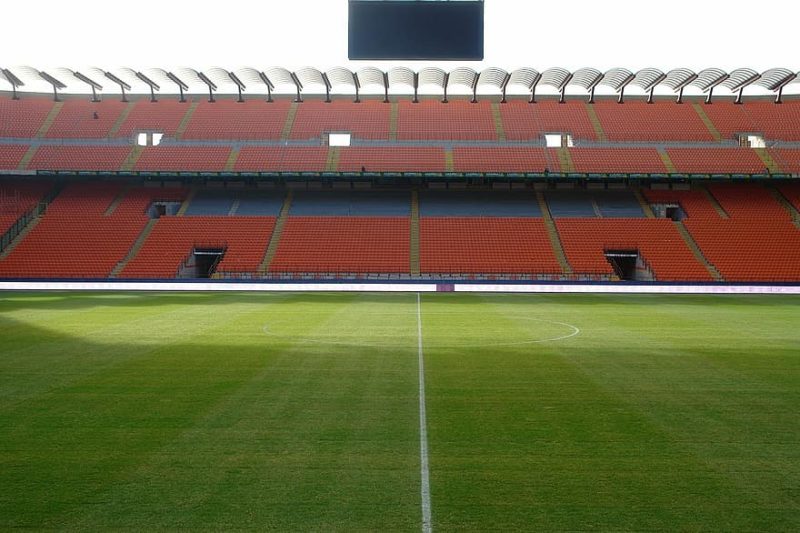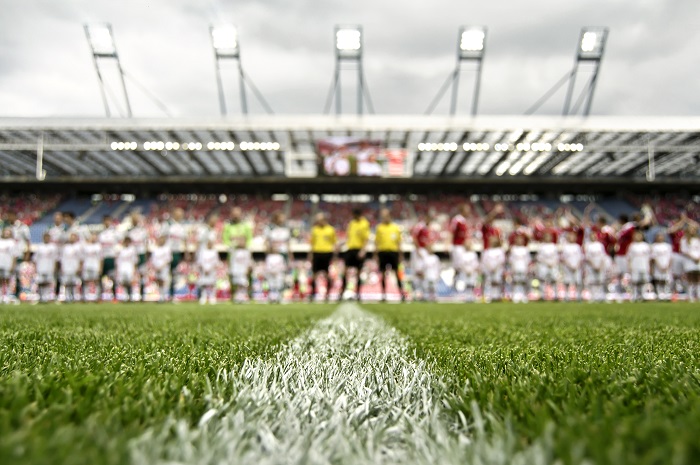The Europa League is the second-tier footballing competition in Europe. It is essentially known as the younger brother of the Champions League but is in no way a competition that brings less quality and excitement.
It is officially known as the UEFA Europa League, and is the same as the Champions League, organised by UEFA. The competition has changed names and formats a few times, but it never failed to bring excitement to football fans across the world.
Origins of the Europa League
The Europa League was originally established in 1971 as a competition that would come in place of the Inter-Cities Fairs Cup. However, the original name of the tournament was the UEFA Cup, and the name stuck all the way till 2009. Also, the Europa League did not have the same system as it has today.
The group stage system was introduced in the 2004/05 season. The idea was to create a competition that has a similar format to the Champions League, but one that draws in more fans and creates quality matchups for the second-tier clubs of Europe.
When I say second-tier clubs, it definitely does not mean that the competition is to be underestimated. Clubs like Barcelona, Juventus, and Arsenal have played in it, but haven’t managed to win it. Showing just how hard it could be to traverse the tournament and go up against clubs that see every game as the pinnacle of their season.
The original cup system format of the UEFA Cup involved teams going up against one another in a two-game matchup. The better would advance and go up against the next team until they reached the finals. Now, there are 32 teams that make it into the main competition. Four teams are divided into eight groups, with the best two teams advancing further.

How to Qualify for the Europa League?
There are several ways in which teams can earn a spot in the Europa League proper. It mainly comes through domestic leagues and the positioning of clubs at the end of the season. Depending on the league where a team comes from, some clubs can earn a direct spot in the group stage of the competition. In some cases, qualification is achieved by winning the domestic cup within a league.
There are three rounds of qualifying where a variety of teams that have started the season as part of the Champions League qualifiers can drop in. It actually happens in the third and final qualifying round, where those unqualified Champions League teams are added and essentially given a second chance.
Also, after the group stage of both the Champions League and the Europa League, the third-positioned teams for the Champions League will play against second-positioned teams from the group stage of the Europa League. This is called the playoff knockout round, where the Champions League teams are given another chance to continue their European journey while adding a dose of quality to the competition.
Ties with the Conference League
Similar to what I’ve just explained above, the same thing happens when it comes to the Europa League and the Conference League. The UEFA Conference League is the youngest European competition, which was founded in the 2021 season.
Clubs that drop out from the Europa League group stage get a chance to compete in the playoff knockouts of the Conference League. It basically means that clubs get to drop down from the footballing pyramid if eliminated from the upper one and get more playing time.
However, it does not necessarily mean that the higher-ranked clubs are superior to the ones from the lower-ranked competitions. It rarely happens that a team that drops down from the upper league wins the lower one.

Europa League Past Winners
The maiden final of the competition played during the 1971/72 season, was an all-English final between Wolverhampton Wanderers and Tottenham Hotspurs. Spurs won 3:2 on aggregate, as the finals were contested in a two-game format back then. The two-game system was dropped in 1997/98, with Inter Milan defeating Lazio 3:0.
The Europa League has mainly been dominated by Spanish clubs, as they have 13 titles in total. The most successful club in the competition is Sevilla, as they have won six trophies. Interestingly, all of their wins came after 2006, and they even managed to win the competition three times in a row in 2014, 2015, and 2016.
Inter Milan, Liverpool, Juventus, and Atletico Madrid share the runner-up position, as each one of them has three titles. Also, the English and the Italian clubs are the second best in this competition as they both have nine wins to their names.
Besides the already mentioned La Liga clubs, Real Madrid (twice), Valencia, and Villarreal have lifted the trophy.
| Season | Winner | Runner-Up | Result |
|---|---|---|---|
| 2021/22 | Eintracht Frankfurt (Ger) | Rangers (Sco) | 1-1 |
| 2020/21 | Villarreal (Spa) | Manchester United (Eng) | 1-1 |
| 2019/20 | Sevilla (Spa) | Inter Milan (Ita) | 3-2 |
| 2018/19 | Chelsea (Eng) | Arsenal (Eng) | 4-1 |
| 2017/18 | Atletico Madrid (Spa) | Olympique Marseille (Fra) | 3-0 |
| 2016/17 | Manchester United (Eng) | Ajax (Ned) | 2-0 |
| 2015/16 | Sevilla (Spa) | Liverpool (Eng) | 3-1 |
| 2014/15 | Sevilla (Spa) | Dnipro Dnipropetrovsk (Ukr) | 3-2 |
| 2013/14 | Sevilla (Spa) | Benfica (Por) | 0-0 |
| 2012/13 | Chelsea (Eng) | Benfica (Por) | 2-1 |
Europa League Top Goalscorers
When mentioning the most leather goalscorers in Europe, some tend to forget the names that were involved in the Europa League competition. The truth is that some of the players that played there also made a mark in the Champions League later on.
However, most of them will forever go down as the best goalscorers in the history of the Europa League and legends of the competition. One such name is the famed Swedish striker, Henrik Larsson, who scored 31 goals for three different clubs (Helsingborg, Celtic, and Feyenoord). Unfortunately for Larsson, he has never won the trophy, even though he appeared in a single final (2002/03).
In second place among all-time goalscorers are Radamel Falcao and Klaas-Jan Huntelaar with 30 goals. Falcao scored for Porto and Atletico Madrid and won a single trophy with both clubs. Falcao is still an active player, but he has been out of form for years now, and it is hard to see his current club, Rayo Vallecano, qualifying any time soon.
On the other hand, Huntelaar is retired and scored goals for Heerenveen, Ajax, and Schalke 04 during his time. Unfortunately for him, while not winning any Europa League trophies, he never even made it close to a single final.
| Season | Top Scorer | Goals |
|---|---|---|
| 2021/22 | James Tavernier (Rangers) | 7 |
| 2020/21 | Borja Mayoral (Roma)Gerard Moreno (Villarreal)Pizzi (Benfica)Yusuf Yazıcı (Lille) | 7 |
| 2019/20 | Bruno Fernandes (Man. Utd & Sporting CP) | 8 |
| 2018/19 | Olivier Giroud (Chelsea) | 11 |
| 2017/18 | Aritz Aduriz (Athletic Bilbao)Ciro Immobile (Lazio) | 8 |
| 2016/17 | Giuliano (Zenit)Edin Dzeko (Roma) | 8 |
| 2015/16 | Aritz Aduriz (Athletic Bilbao) | 10 |
| 2014/15 | Romelu Lukaku (Everton) Alan (Salzburg) | 8 |
| 2013/14 | Jonathan Soriano (Salzburg) | 8 |
| 2012/13 | Libor Kozak (Lazio) | 8 |
2022/23 Europa League
The 2022/2023 season of the Europa League competition has definitely been one of the more interesting ones. With a lot of famed clubs dropping down from the Champions League, it quickly became a hotly contested tournament with a lot of favourites all in one place.
The Group Stage featured contenders like Arsenal, Manchester United, and Conference League winners Roma. Things got even more tested when dropouts from the Champions League were added in the knockout playoff stage. Juventus, Barcelona, and Sevilla joined the ranks in the Europa League, with Juventus and Sevilla making it all the way to the semi-finals.
At the end there were two, as the 2022/23 Europa League title will be contested between Sevilla and AS Roma. Sevillistas managed to defeat Juventus in the semis with an aggregate score of 3:2. Sevilla were actually down after Vlahovic scored in the second game. But thanks to Suso, the game went into overtime, where Erik Lamela scored to take Sevilla upfront.
Jose Mourinho continued to do the impossible and, after winning the Conference League last year, now has a chance to win the Europa League with Roma. Giallorossi advanced to the finals thanks to Edoardo Bove scoring the only goal in both ties.
The final is set to take place at Puskas Arena in Budapest on 31. May. Sevilla has a chance to win their record-breaking 7th title, while Roma seeks to add their second European trophy. On the other hand, Jose Mourinho could add his sixth major European title after two Champions League titles, two Europa League wins, and a single Conference League trophy.













